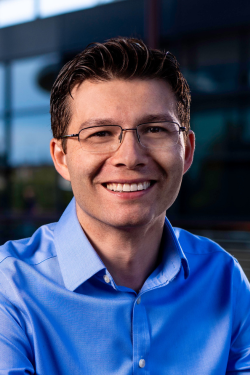Recognized for:
Transformative and therapeutically relevant insights into the molecular and cellular steps underlying the assembly of the human brain and the mechanisms leading to neuropsychiatric disease.
Areas of Research Interest and Expertise:
Assembloids, Organoids, Neurodevelopment, Neuropsychiatric Disorders
Previous Positions:
Associate Professor, Stanford University
Assistant Professor, Stanford University
Postdoctoral Fellow, Stanford University (Advisor: Ricardo Dolmetsch)
MD, I. Haţieganu Medical School, Romania
Research Summary:
Understanding the development, function, and dysfunction of the human brain at the level of genes, cells and circuits has been hindered by the inaccessibility of these processes. Sergiu Pasca, MD has circumvented this challenge by innovating bottom-up approaches in which neural circuits can be generated in vitro from stem cells in preparations he named assembloids that capture key stages of human brain development outside of the human body. This approach has revealed details about the developmental timing and self-organization of the nervous system, the molecular mechanisms leading to neuropsychiatric diseases, and paves the way towards the development of new therapeutics.
Key Publications:
- X. Chen#, F. Birey#, M-Y Li, O. Revah, R. Levy, M. Thete, N. Reis, K. Kaganovsky, M. Onesto, N. Sakai, Z. Hudacova, J. Hao, X. Meng, S. Nishino, J.R. Huguenard, and S.P. Pașca*. Antisense oligonucleotide therapeutic approach for Timothy syndrome. Nature, 2024.
- O. Revah#, F. Gore#, K. Kelley#, J. Andersen, N. Sakai, X. Chen, M-Y Li, F. Birey, X. Yang, N. Saw, S. Baker, N. Amin, S. Kulkarni, R. Mudipalli, B. Cui, S. Nishino, G.A. Grant, J.K. Knowles, M. Shamloo, J. Huguenard, K. Deisseroth, and S.P. Pașca*. Maturation and circuit integration of transplanted human cortical organoids. Nature, 2022.
- J. Andersen, O. Revah, Y. Miura, N. Thom, N.D. Amin, K.W. Kelly, M. Singh, X. Chen, M.V. Thete, E. Walczak, H. Vogel, C. Fan, and S.P. Pașca*. Generation of functional human 3D cortico-motor assembloids. Cell, 2020.
- F. Birey#, J. Andersen#, C. Makinson#, S. Islam, W. Wei, N. Huber, C.H. Fan, K. Metzler, G. Panagiotakos, N. Thom, N.A. O’Rourke, L.M. Steinmetz, J.A. Bernstein, J. Hallmayer, J.R. Huguenard, and S.P. Pașca*. Assembly of functionally integrated forebrain spheroids. Nature, 2017.
Other Honors:
2024 The Chica and Heinz Schaller Award in Translational Neuroscience
2024 ISSCR Momentum Award, International Society for Stem Cell Research
2023 Knight of the Order of Merit, The Chancery of Orders
2023 Sumitomo/Sunovion Brain Award, International College of Neuropsychopharmacology
2022 IBRO-Kemali International Award in Neuroscience, IBRO
2021 Judson Daland Prize, American Society of Philosophy
2021 Joseph Altman Award for Developmental Neuroscience, Japanese Neuroscience Society
2018 Daniel H. Efron Research Award, American College of Neuropsychopharmacology
2018 Günter Blobel Award, American Society of Cell Biology
2018 Vilcek Prize for Creative Biomedical Research, Vilcek Foundation
In the Media:
TED 2022 – How we’re reverse engineering the brain in the lab
Stanford Medicine – How assembloids are changing the future of brain research
CGTN America – Mapping the Brain
Quanta – Human Brains Are Hard to Study. He Grows Useful Substitutes
